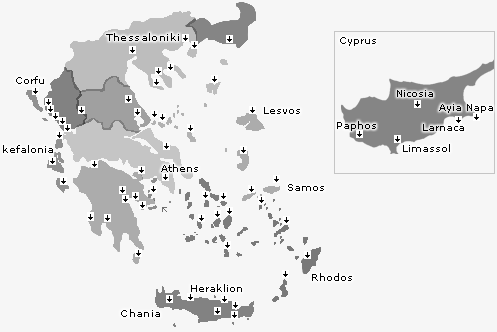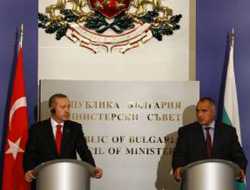Published: 07 October 2010
The leader of Bulgarian nationalist party Ataka yesterday (6 October) surprised his big political ally, the ruling GERB party of Prime Minister Boyko Borissov, by staging an anti-Turkish show and slamming the government’s relations with Ankara in parliament. Dnevnik, EurActiv’s partner in Bulgaria, reports.
Wearing a black T-shirt saying ”No’ to Turkey in the EU’, Ataka leader Volen Siderov took the floor and blasted the government’s handling of a recent visit of Turkish Prime Minister Recep Tayyip Erdoğan to Bulgaria.
Without naming Borissov, Siderov said that by receiving Erdoğan with “hugs and kisses,” those in power had being playing an “anti-Bulgarian game” and declared that more such mistakes would “not be tolerated”.
“I would like to tell [the government] that you are wrong when you assume that Turkey comes here with friendly intentions. It is a mistake to make compromises with Ankara,” Siderov said.
The incident blew up as parliament was debating an unrelated vote of ‘no confidence’ initiated by the opposition Socialists over the country’s collapsing healthcare system (see ‘Background’).
The vote was seen as a way for the socialists to flex their muscles, as the divided opposition was not expected to bring down the government.
Ataka, seen by many as the ruling centre-right GERB party’s most faithful partner, signalled for the first time that their support should not be taken for granted.
10 billion euro claim
Siderov claimed that Erdoğan’s visit on 3 October had been prepared “in secret” in order to prevent Ataka from handing the Turkish prime minister a document asking Turkey to pay Bulgaria 10 billion euros in compensation for property lost during World War I.
Bulgarian nationals were forced to leave Turkey between 1912 and 1925, leading Bulgaria to claim ten billion euros in compensation for lost land and real estate. The Angora Protocol of 1925 recognises Bulgarians’ right to be compensated for their lost property.
When the Bulgarian government was set up, Bozhidar Dimitrov, the minister representing Bulgarians abroad, said that Sofia would link the compensation issue to Turkey’s EU talks. Borissov later rapped Dimitrov for the misplaced comment and said his country would pursue its interests outside the EU framework.
“Where are you, my friend Bozhidar,” Siderov said in parliament, dramatically appealing to Dimitrov, who was not present in the room.
The leader of Ataka also blasted what he called declarations of support by the Bulgarian government for Turkey’s EU accession bid.
During his visit to Sofia, Borissov said that “Bulgaria, as a good neighbour, supports Turkey’s prospects for joining the EU”.
For his part, Erdoğan complained that the EU was putting up new hurdles on the way to Turkey’s EU accession bid, claiming these represented a “double standard” compared to other EU hopefuls such as Croatia.
Referendum test
Ataka has stepped up its anti-Turkey campaign in recent months, calling ever more aggressively for a referendum on Turkey’s EU accession to be held.During Erdoğan’s visit, Borissov said it was too early to decide. “The issue about the referendum on Turkey’s EU accession will be on the agenda when Turkey completes its EU accession negotiations,” Borrisov said.
Over a recent visit to Brussels, Turkey’s chief EU negotiator Egemen Bağış said his country was not afraid of referenda being held in EU countries over Turkey’s EU accession.
Positions
“We have been the witnesses of an outright political delirium,” said Lyutvi Mestan, leader of the liberal MRF party, following Siderov’s statements in parliament.
Mestan added that the democratic Bulgarian parliament had never heard such “outright insults” in its 20-year history with respect to the prime minister of another country.
Socialist leader Sergei Stanishev blasted National Assembly President Tsetska Tsacheva for having allowed the leader of Ataka to disturb the work of the parliament in the midst of a no-confidence vote.
Background
Ataka (National Union Attack), a nationalist, xenophobic and homophobic party, is represented in the Bulgarian parliament with 21 MPs out of 240. In the European parliament, Ataka has two MEPs.
Following the July 2009 national elections, the centre-right GERB party of Boyko Borissov obtained 117 seats in Parliament, falling short of an absolute majority.
GERB (the acronym stands for ‘Citizens for the European Development of Bulgaria’) is affiliated to the European People’s Party (EPP), the largest political group in the European Parliament.
GERB leader Boyko Borissov, who became prime minister after the 2009 election, leads a minority government tacitly supported by Ataka and by a smaller group, called the ‘Blue Coalition’. The latter brings together leaders from the former anti-Communist Union of Democratic Forces (SDS) and its rival party, the Democrats for a Strong Bulgaria (DSB).
The main opposition in Bulgaria consists of the Socialist Party (40 MPs and six MEPs) and the Movement for Rights and Freedoms (MRF), a party harbouring the country’s Turkish minority, with 37 MPs and three MEPs. In the European Parliament, MRF is affiliated to the liberal ALDE group (click here for more).







